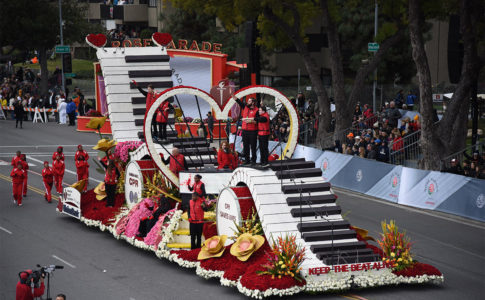One student learns the value of mastering practice to master performance.
We stand in our spots, still as stone, waiting for the command. Our breath fogs up in the cold air, and I suppress a shiver. Movement of any kind during a standstill attracts attention and detracts points.
A voice breaks the still air, “Marchmasters, is your band ready?” In the corner of my eye I see the drum majors salute. “The field is yours for competition,” says the voice, sending the drum majors flying to their podiums. The drum major gives us four beats, and we are off.
Movement and music collide, covering the field with sound and visuals as I focus on my snare part and staying in step. Back and forth across the field, I march, listening to the other snares to ensure cleanliness in the music. Suddenly, I find myself on the last set of the Opener, playing the final few measures. As the notes fade into the darkness, we resume our stone-still positions.
“Good,” said the voice, our marching band director. “Now run it back to set eight. We need to run that section again.”
It is 6:30 on a Monday morning, and the marching band is rehearsing for the state competition.
Perfect Practice
Practice separates the okay from the good. Starting in the middle of August, about 100 Marchmaster students wake up at 5, arrive at the stadium around 6, and stand on the field by 6:30 to start practice. Every day, Monday through Friday, we follow this routine, making bizarre shapes on the field over and over and over. But all bands do this.
We are different because we have perfect practice.We treat practice like a competition, using every rep, every minute to improve. Why band kids decide to wake up before sunrise and play their show hundreds of times, I don’t know. What I do know is that being great requires discipline, focus, and practice. Somewhere along my life, I decided band was worth all the early morning rehearsals, the focus, the discipline.
Only Practice?
But at first, I treated practice as nothing more than something others told me to do.
“Measure 55. Hurry up, front line,” said Stan, our drum line instructor.
It is 7 p.m., Monday night, my freshman year and my first year of marching band. Sighing, I lay my mallets on the marimba and wait for him to set tempo. I had played the passage approximately 1,000 times, and I wanted to move to something else. After all, this was only practice. Once we reached competition, I would play the passage perfectly, no problem.
Stan counted us off, and we began the long and difficult passage. Missing a couple notes, I finish the run and look at Stan expectantly. Yeah, I missed some notes, but that was because I was tired and bored. Excuses crowded my vocabulary back then; of course, I did not think of them as excuses at the time.
Shaking his head, Stan said, “You’re rushing. Feel the pulse,” and counted us off again. Once more I played my part; once more I missed a few notes.
“Marchmasters, the field is yours for competition,” said the announcer. It is Saturday afternoon, my first competition.
Racing to their podiums, the drum majors stand before me and give the band four beats. After what seems like moments, we reach measure 55. And unlike rehearsal, I was not going to miss any notes. Gripping my mallets, I began the run, only to mess up halfway through and fake the rest of it. Disappointment washed over me. I was not supposed to mess up like I did in rehearsal because this time because, unlike rehearsal, I wanted to play the passage well. Surely thinking about playing well should have worked. And then the two clicked. Practice is just as real as the competition, just as important. I would only improve by treating every practice, every rep, every beat the same way I would in competition.
Ready for Performance
Three years later, I am a senior. Nothing about practice has changed, and it never will. Even so, the band does not know how rehearsal should go at first. First-time students watch the upperclassmen and their squad leaders to learn. If the leaders display focus and determination, the others will follow. In August, the band was talkative and jittery, excited about the show and meeting new people. They did not know what to do with their extra energy until the leaders taught them to channel the energy into focus. Leaders are everything to a successful practice, and with time and patience, leaders can make the band feel the focused atmosphere rehearsals need. Slowly, the others will catch on, and by October, the peak of marching season, the band will improve rapidly with focused practice.
We stand in our spots, still as stone, waiting for the command. Feeling a bead of sweat roll down my face, I resist the urge to wipe it. Movement detracts points, and this was the state competition, the event we practiced months for.
“Marchmasters, is your band ready?”
Yes, yes we are because we practiced.

